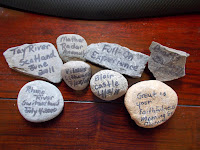What I have learned ...since last summer
 |
| Eastern Phoebe |
INAM
I have these initials written on my left index finger most days. Most people don't notice (they aren't supposed to notice it) so there aren't questions about what it means. These three letters are an acronym for part of my daily prayer on the way to school every morning. It has become a mantra for me (NOT a Vedic hymn but a statement repeated to myself frequently). I pray for the Holy Spirit to remind me that It is Never About Me. I draw this from two passages of Scripture. The first is the Great Commission (Matthew 28:18-20). The one command in that passage is to make disciples as you are going. Disciple-making is not about me. Jesus related the Great Commission and its goal succinctly for me in His conversation with Pilate John 18:33-40. The salient part is in verse 37, "Then Pilate said to him, "So you are a king?" Jesus answered, "You say that I am a king.For this purpose, I was born and for this purpose, I have come into the world--to bear witness to the truth. Everyone who is of the truth listens to my voice." It is Never About Me. It is about Christ in me (difficult to say that without saying, "the hope of glory.")
URR4U
Jesus never said, "if you love me you will make sure others obey my commands." Jesus said, ". . . if you love me you will obey my commands."(John 14:15) Let me break that down for you: You (U) Are (R) Responsible (R) for(4) You (U). We see this clearly in Jesus's own words in Matthew 7:5,
"Hypocrite! First get rid of the log in your own eye; then you will see well enough to deal with the speck in your friend's eye."
It is easy to get distracted thinking about what others are doing or should be doing, and not keep your house clean. I have enough planks to build a log cabin, two-story, with a wrap-around porch.
If you read Paul's epistles you discover lots of folks were distracted by false gospels, petty bickering, legalism, and the list continues. Paul summed up URR4U in Philippians 3:13-14,
"Brothers, I do not consider that I have made it my own. But one thing I do: forgetting what lies behind and straining forward to what lies ahead, I press on toward the goal for the prize of the upward call of God in Christ Jesus."
In other words, don't get distracted. My friend Paul has one more exhortation for us about URR4U in 1 Thessalonians 4:11-12:
". . . make it your ambition to lead a quiet life, mind your own business, and work with your hands just as we told you so that your life will win the respect of outsiders and you will not be dependent on anybody."
By the way, you will often seeAQMYOBWRND on my index finger. Yes, it takes up a lot of space, but it serves as a reminder of the truth of 1 Thessalonians 4:11-12.
Keep your eye on the prize, MYOB. URR4U.
RIVAL
This is the last acronym, I promise. This one steps outside of Biblical application to affect almost every part of my life. Meetings are a fact of life. Sunday school meetings, business meetings, parent meetings, small group meetings . . . need I go on? Any time I raise my hand in a meeting I should have a checklist that pops up in my head that has two steps:
1. Open mouth
2. Insert foot
If offending people were a spiritual gift, I would have a double dose of it.
In the fall of 2017, I was having a conversation with a dear friend (whom I haven't offended yet) about a student who talked too much. She said he will start with a comment that is not relevant and then expound endlessly on his comment... pontificate to demonstrate his knowledge. She shared with me something she developed to use at meetings when she might be tempted to raise her hand and ask a question or make a comment (backstory on why she needed it not included here). I took what she had and put it to an acronym and have been using it since to mixed success. Oh, it has been successful for me, but when people to expect you to ask questions or comment at a meeting and you don't they think you are passive aggressive. So here it is:
R Is what I have to say relevant? Does it have something to do directly with the topic at hand? Do I just want to have something to say? "A fool speaks to have something to say, but a wise man speaks when he has something to say."
I Is what I have to say important to the audience, to the subject or for general information?
V Will what I have to say add value to the conversation? Will it contribute to the dialogue, clarify a point, or give an example?
A Will the group or person accept what I have to say? Do they care about what I have to say?
L If the answer to any of the above questions is "NO", then I Listen and Learn. A wise saying is, "It is best to be silent and thought a fool than to speak up and remove all doubt." I always have paper or my journal, and I busy myself taking notes at the meeting (even if I might throw them away later). If I am taking notes I am paying attention.
That's what I have learned since last Summer that I can share. Working on an acronym to help with anger using James 1:19-20. I have several verses and idea processes that have helped me with anger, but I haven't codified them. More on that later.


Comments
Post a Comment